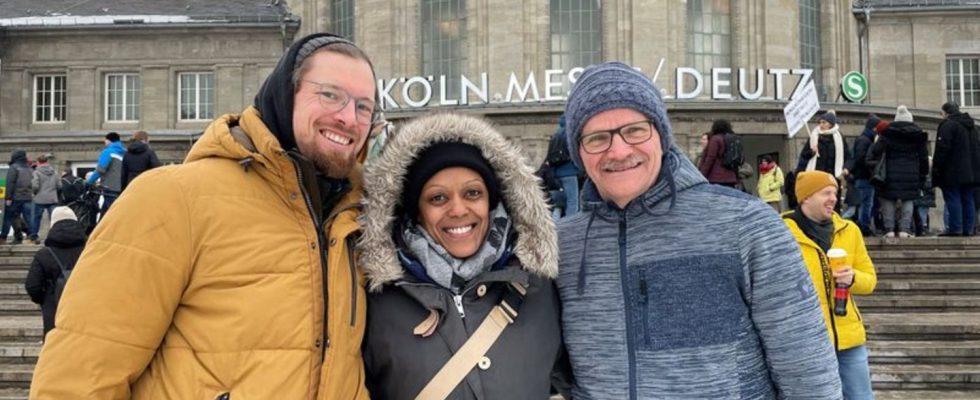Hundreds of thousands take to the streets in a single weekend to take a stand against right-wing extremism. In big and small towns. In East and in West. More can develop from this, says a researcher.
Bonita knows exactly what it feels like to be a second-class citizen. “I’m a native of South Africa and lived through the apartheid era. I know what it means to have no freedoms and to live in fear because the government says: ‘You have no say here.'” At the age of 18, Bonita went Germany. That was 28 years ago now. She started a family here and took on German citizenship. She considers Germany her home. Also because she always had the feeling that she was safe here. That she could never lose her civil rights here again. But now that certainty has suddenly been shattered.
“I’m afraid that at some point it will mean: The AfD has decided that those who weren’t born here should go back. What does that mean for me and my family? That’s my fear.” That’s why she went to Cologne this Sunday to demonstrate against right-wing extremism – like hundreds of thousands of people in many other German cities this weekend.
On Saturday alone, at least 300,000 demonstrators took to the streets, including 35,000 in Frankfurt/Main and Hanover, 30,000 in Dortmund, 20,000 in Karlsruhe and Stuttgart, 18,000 in Heidelberg, 16,000 in Halle, 15,000 in Nuremberg, 12,000 each in Kassel and Gießen and Recklinghausen and 9,000 in the Thuringian state capital Erfurt, where AfD politician Björn Höcke wants to take over the government as the election winner in the fall.
“An intergenerational civil society”
The geographical breadth of the rallies is remarkable, says conflict researcher Andreas Zick of the German Press Agency. East and West are represented, metropolises as well as smaller cities. In addition, people who had never demonstrated before or had not demonstrated for years took part. “It’s not just the expected urban, educated and committed milieu, but a cross-generational civil society.” You can feel that a jolt has gone through society: “It hasn’t happened in a long time that judges, churches and, above all, companies have sided with the demonstrations so clearly.”
But what is it that suddenly triggered this jolt? After all, the AfD has been strong in the polls for many months. These are probably the frighteningly specific details that have become known thanks to research by the media company Correctiv about the meeting of right-wing radicals in a Potsdam villa in November. Several AfD politicians as well as individual members of the CDU and the very conservative Values Union also took part. The former head of the right-wing extremist Identitarian Movement in Austria, Martin Sellner, said he had spoken about “remigration”.
“This involuntarily brings back memories of the terrible Wannsee Conference,” said Federal Interior Minister Nancy Faeser (SPD) to the Funke media group. She doesn’t want to equate the two. “But what is hidden behind harmless-sounding terms like ‘remigration’ is the idea of expelling and deporting people en masse because of their ethnic origin or their political views.”
At the Wannsee Conference on January 20, 1942 – exactly 82 years ago on Saturday – high-ranking Nazi officials discussed the systematic murder of European Jews. The 15-page minutes of the meeting, which lasted just 60 to 90 minutes, are one of the few surviving official documents showing the chief planners of the Holocaust in action. What is striking is the bureaucratic cover language in which the intended genocide is negotiated: terms such as “evacuation”, “natural reduction”, “treated accordingly” and “possible solutions” all stand for murder. The parallel to the euphemistic term “remigration” makes one shiver.
Satirical videos on the internet
At the same time, there is also something absolutely bizarre about the idea that right-wing extremists are fantasizing about deporting millions of people in anticipation of a blue seizure of power. This is exactly what inspired a whole series of satirical videos that are currently being shared on social networks.
Influencer Farro films herself putting on make-up and asks the AfD in a conversational tone to please specify the deportation plans as soon as possible: “It would be really correct of you if you somehow said a date or a deadline like that, Because I’ve just started getting my driver’s license, and it would be really fresh if you let me finish my driver’s license as soon as possible. I would then go through with it – a big word of honor to you!”
Video maker Tahsim, on the other hand, recommends refuges on Instagram where you can hide when the deportation starts. One of his recommendations: simply join the AfD youth organization Junge Alternative, no one will suspect you. He also calls the AfD’s federal office and asks: “And can I join if I have a migration background?”
Are the demonstrations just a brief flare-up or is a broad democratic counter-movement building up? “It is not yet a movement in the usual sense, but it is a clear countermovement against the upward trend of the AfD and the further penetration into parliaments, into culture and everyday life,” says scientist Zick. “For this to happen, further networks and activities must emerge. We will have to wait and see. But no matter what develops, for the moment it is an important joint movement with old and new actors, a broad alliance of groups including business, politics and civil society. This shows that democracy has binding powers and that the majority does not want any further shift to the right.”
For Bonita, a native of South Africa, it is also clear that this demo weekend can only be the beginning. “If we say we did three demos and now we’re sitting at home again, that can’t be right,” she says. “I think we have to constantly show that we are against it. There can be no going back.”

